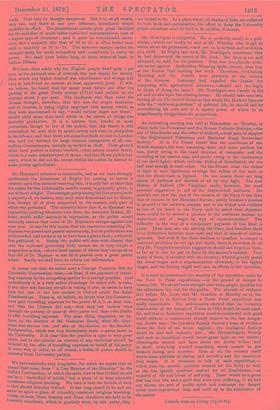We have often asked why the English people fixed upon
5 per cent. as the national rate of interest, the just rental for money, than which any higher demand was extortionate and wrong, and have at last found an answer, at least apparently good. It will, we believe, be found that for many years before and after the passing of the great Usury statute (1714) land yielded on the average about 5 per cent. The landlords who then ruled the Houses thought, therefore, that five was the proper maximum rate of interest, it being highly improper that money, which, as they were accustomed to say, " could neither beget nor breed," should yield more than land, which in the nature of things was annually productive. It is a curious fact, known to most journalists, though to few of the public, that this theory is still entertained by men able to spend money and time on pamphlets in its defence; and that there are some hundreds of men in London who hold the demand for large interest, irrespective of all con- trolling circumstances, morally as wicked as theft. Their ground when hard pushed is always twofold,—that money cannot breed, which is a mere misstatement of terms ; and that Moses prohibited usury, which he did not do, except within the nation he desired to make purely agricultural.






































 Previous page
Previous page